new posts in all blogs
Viewing: Blog Posts Tagged with: The Oxford Comment, Most Recent at Top [Help]
Results 1 - 25 of 32
How to use this Page
You are viewing the most recent posts tagged with the words: The Oxford Comment in the JacketFlap blog reader. What is a tag? Think of a tag as a keyword or category label. Tags can both help you find posts on JacketFlap.com as well as provide an easy way for you to "remember" and classify posts for later recall. Try adding a tag yourself by clicking "Add a tag" below a post's header. Scroll down through the list of Recent Posts in the left column and click on a post title that sounds interesting. You can view all posts from a specific blog by clicking the Blog name in the right column, or you can click a 'More Posts from this Blog' link in any individual post.

By: Estefania Ospina,
on 10/6/2016
Blog:
OUPblog
(
Login to Add to MyJacketFlap)
JacketFlap tags:
*Featured,
Audio & Podcasts,
Theatre & Dance,
Guyana,
Online products,
Caribbean culture,
Caribbean Dance,
crop over festival,
exploitation of the black female body,
female empowerment,
Jamaican dance hall,
representations of black women,
rihanna's song birthday cake,
whining dance,
women’s sexuality,
Music,
barbados,
rihanna,
The Oxford Comment,
Add a tag
“Come and put your name on it,” is the first line in Rihanna’s song “Birthday Cake.” She is referring to her female anatomy as she dances in a hip-centered motion, reminiscent of Caribbean movement.
Across the globe, reactions to the song’s connotation and the provocative dancing varied greatly, each individual interpreting the sequence of events based on their own experiences, culture, race and gender. Regardless of the response to the song, the fact that Rihanna’s persona and image are an implication of something greater than herself cannot be denied.
In this episode of the Oxford Comment, Adanna Jones, contributor to the Oxford Handbooks Online, Oneka LaBennett, author of She’s Mad Real: Popular Culture and West Indian Girls in Brooklyn, and Treva Lindsey, author of the forthcoming Colored No More: New Negro Womanhood in the Nation’s Capital, discuss the transnational icon, born in Barbados with Guyanese roots instilled from her upbringing, that challenges the exploitation of the black female body, female empowerment, and what that means in a global space.
Featured Image Credit: Rihanna performing at the Kollen Music Festival 2012 by Jørund F Pedersen. CC BY-SA 3.0 via Wikimedia Commons.
The post Rihanna and representations of black women – Episode 39 – The Oxford Comment appeared first on OUPblog.


By: Estefania Ospina,
on 9/1/2016
Blog:
OUPblog
(
Login to Add to MyJacketFlap)
JacketFlap tags:
oxford english dictionary,
etymology,
Linguistics,
Exotic,
The Oxford Comment,
*Featured,
Audio & Podcasts,
Theatre & Dance,
Online products,
Arts & Humanities,
The Naked Result,
commodities,
exotic dancing,
luxury items,
Luxury: A Rich History,
Redeeming Kamasutra,
Western world,
Books,
History,
Literature,
Language,
India,
Add a tag
The word “exotic” can take on various different meanings and connotations, depending on how it is used. It can serve as an adjective or a noun, to describe a commodity, a person, or even a human activity. No matter its usage, however, the underlying perception is that is refers to something foreign or unknown, a function which can vary greatly in unison with other words, from enriching the luxury status of commodities, to fully sexualizing a literary work of psychology and anthropology, such as the Kamasutra.
In this episode of the Oxford Comment, we sat down with Eleanor Maier, Senior Editor at the Oxford English Dictionary, Giorgio Riello, co-author of Luxury: A Rich History, Wendy Doniger, author of Redeeimg the Kamasutra, Jessica Berson, author of The Naked Result: How Exotic Dance Became Big Business, and Rachel Kuo, contributing writer at everydayfeminism.com, to learn more about the history and usage of the word.
The post Exotic – Episode 38 – The Oxford Comment appeared first on OUPblog.


By: Estefania Ospina,
on 8/4/2016
Blog:
OUPblog
(
Login to Add to MyJacketFlap)
JacketFlap tags:
non-profit,
The Oxford Comment,
*Featured,
Audio & Podcasts,
Benezit Dictionary of Artists,
Arts & Humanities,
public service,
Kathy Battista,
new technologies,
Experiments in Art and Technology,
Grove Dictionary of Art,
Julia Robinson,
Julie Martin,
Robert Whitman,
scientists and engineers,
telecommunications technology,
Technology,
new york,
Add a tag
Founded in 1966 by Billy Klüver, Fred Waldhauer, Robert Rauschenberg and Robert Whitman, Experiments in Art and Technology (E.A.T.) was a non-profit group that fostered collaboration between artists and engineers. Active between the 1960s and 1980s, E.A.T. recruited scientists and engineers to work with artists looking to incorporate new technologies into artworks, performances, and installations. The organization also pioneered educational and public service projects that exposed the general public to telecommunications technology and expanded media access in countries across the globe.
This episode of the Oxford Comment is the second in our two-part series in conjunction with the Benezit Dictionary of Artists. We resume our roundtable conversation at the New York office with artist Robert Whitman, Benezit Editor in Chief, Dr. Kathy Battista, and Experiments in Art and Technology Director Julie Martin, to discuss many of E.A.T.’s noteworthy and laudable undertakings. To learn more, our multimedia producer, Sara Levine, also interviews Dr. Julia Robinson, a Grove Dictionary of Art contributor and professor of Art History at New York University, about E.A.T.’s role in the development of the performance art medium in New York in the 1960s and 1970s.
Featured image credit: Billy Klüver talking about E.A.T. and 9 Evenings to a group of artists and engineers in Toronto. Artists’ requests to the engineers for their 9 Evenings performances are projected on the wall behind him. Photographer Unknown. All rights reserved. Image reproduced with permission from Julie Martin and E.A.T.
The post Experiments in Art and Technology – Episode 37 – The Oxford Comment appeared first on OUPblog.


By: Estefania Ospina,
on 8/4/2016
Blog:
OUPblog
(
Login to Add to MyJacketFlap)
JacketFlap tags:
Technology,
new york,
non-profit,
The Oxford Comment,
*Featured,
Audio & Podcasts,
Benezit Dictionary of Artists,
Arts & Humanities,
public service,
Kathy Battista,
new technologies,
Experiments in Art and Technology,
Grove Dictionary of Art,
Julia Robinson,
Julie Martin,
Robert Whitman,
scientists and engineers,
telecommunications technology,
Add a tag
Founded in 1966 by Billy Klüver, Fred Waldhauer, Robert Rauschenberg and Robert Whitman, Experiments in Art and Technology (E.A.T.) was a non-profit group that fostered collaboration between artists and engineers. Active between the 1960s and 1980s, E.A.T. recruited scientists and engineers to work with artists looking to incorporate new technologies into artworks, performances, and installations. The organization also pioneered educational and public service projects that exposed the general public to telecommunications technology and expanded media access in countries across the globe.
This episode of the Oxford Comment is the second in our two-part series in conjunction with the Benezit Dictionary of Artists. We resume our roundtable conversation at the New York office with artist Robert Whitman, Benezit Editor in Chief, Dr. Kathy Battista, and Experiments in Art and Technology Director Julie Martin, to discuss many of E.A.T.’s noteworthy and laudable undertakings. To learn more, our multimedia producer, Sara Levine, also interviews Dr. Julia Robinson, a Grove Dictionary of Art contributor and professor of Art History at New York University, about E.A.T.’s role in the development of the performance art medium in New York in the 1960s and 1970s.
Featured image credit: Billy Klüver talking about E.A.T. and 9 Evenings to a group of artists and engineers in Toronto. Artists’ requests to the engineers for their 9 Evenings performances are projected on the wall behind him. Photographer Unknown. All rights reserved. Image reproduced with permission from Julie Martin and E.A.T.
The post Experiments in Art and Technology – Episode 37 – The Oxford Comment appeared first on OUPblog.


By: Priscilla Yu,
on 4/7/2016
Blog:
OUPblog
(
Login to Add to MyJacketFlap)
JacketFlap tags:
sara levine,
America and the Easter Rising,
Easter Rising,
Ireland: Easter 1916,
Ireland’s Exiled Children,
Irish independence,
Political Imprisonment and the Irish 1912-1921,
Robert Schmuhl,
The Rising (Centenary Edition),
William Murphy,
History,
ireland,
Europe,
Fearghal McGarry,
The Oxford Comment,
*Featured,
Add a tag
This past Easter marked the 100th anniversary of the Easter Rising, an armed uprising by Irish rebels against British rule in 1916. An insurrection that lasted almost a week, the Easter Rising began as a small rebellion on Easter Sunday and turned into a full uprising by Easter Monday, 24 April 1916. Rebels seized prominent buildings in the city of Dublin, took up arms against British troops, and declared Ireland as a republic and independent from the United Kingdom. However, the rebels were quickly overpowered and surrendered. Although the uprising had little Irish support at first, the execution of rebellion leaders transformed public opinion about British rule and as a result, became a turning point during Ireland’s struggle for independence.
In this month’s episode of The Oxford Comment, host Sara Levine chats with William Murphy, author of Political Imprisonment and the Irish, 1912-1921; Fearghal McGarry, author of The Rising (Centenary Edition): Ireland: Easter 1916; and Robert Schmuhl, author of Ireland’s Exiled Children: America and the Easter Rising. Together, they engage in fascinating conversation about the experience of women during the Easter Rising, the cultural and national identity that was forged between the rebels in prison after the uprising, and the role Americans played as support and inspiration for the Irish.
Featured image credit: The shell of the G.P.O. on Sackville Street (later O’Connell Street), Dublin in the aftermath of the 1916 Rising. Date: May? 1916 NLI Ref.: Ke 121. Photo by Keogh Brothers Ltd., photographers. Public domain via Wikimedia Commons.
The post The Easter Rising – Episode 33 – The Oxford Comment appeared first on OUPblog.


By: SoniaT,
on 3/3/2016
Blog:
OUPblog
(
Login to Add to MyJacketFlap)
JacketFlap tags:
Journals,
Politics,
The Oxford Comment,
*Featured,
Review of Environmental Economics and Policy,
Earth & Life Sciences,
dale jamieson,
reason in a dark time,
sara levine,
Alan Alexandroff,
Global Summitry,
Journal of Environmental Law,
Liz Fisher,
Oxford University Press Podcast,
Richard Bardgett,
Amber Stubler,
Gib Metcalf,
Maria Gavouneli,
The Yearbook of International Environmental Law,
Books,
Law,
Add a tag
The Paris Agreement, held from 30 November to 12 December 2015, has been hailed as a "historic turning point" in the battle against global climate change. Consequently, dialogue surrounding greenhouse gas emissions, particularly around political and economic compliance.
The post Climate change and COP21 – Episode 32 – The Oxford Comment appeared first on OUPblog.

By: SoniaT,
on 2/4/2016
Blog:
OUPblog
(
Login to Add to MyJacketFlap)
JacketFlap tags:
dale jamieson,
reason in a dark time,
Oxford University Press Podcast,
resource exploitation,
Leif Wenar,
Blood Oil,
Tyrants Violence and the Rules that Run the World,
Natural Resource Trade,
The Resource Curse,
Responsible Consumerism,
Why the Struggle to Stop Climate Change Failed,
The Oxford Comment,
*Featured,
Add a tag
Global inequality, particularly as it exists today, has proven to be more “process” than state of being. An era of unprecedented interconnection means that individual practices, just as much as large-scale social, political, and economic actions, shape, sustain, and reinforce power dynamics. Consumerism is one such practice, transferring economic power from the hands of those who buy goods to those that supply them. Seldom, though, do we stop to consider whose pockets we are lining in our consumption, whether buying a new television or refueling at our local gas station.
In this month’s episode of The Oxford Comment, Leif Wenar, author of Blood Oil: Tyrants, Violence, and the Rules that Run the World, and Dale Jamieson, author of Reason in a Dark Time: Why the Struggle to Stop Climate Change Failed, explore the unseen costs of consumer demand, corporate conduct, and more, including the increasing destabilization of our global political (and environmental) system. Together, they contemplate the “revolutionary” consequences of changing the means by which we live, moving our world toward a new era of ethics, sustainability and security.
Image Credit: “War and Poverty” by Kelly Short. Public Domain via Flickr.
The post The resource curse – Episode 31 – The Oxford Comment appeared first on OUPblog.


By: SoniaT,
on 1/7/2016
Blog:
OUPblog
(
Login to Add to MyJacketFlap)
JacketFlap tags:
Oxford University Press Podcast,
OUP Podcast,
Teaching Music to Students with Autism,
Taylor Walkup,
Adam Goldberg,
Karmen Ross,
Special Needs Students,
Hyacinth Heron Haughton,
Books,
Music,
Education,
music education,
Special Needs Education,
The Oxford Comment,
*Featured,
music therapy,
Alice Hammel,
Add a tag
More than ever before, educators around the world are employing innovative methods to nurture growth, creativity, and intelligence in the classroom. Even so, finding groundbreaking ways to get through to students can be an uphill battle, particularly for students with special needs.
The post Learning from music therapy – Episode 30 – The Oxford Comment appeared first on OUPblog.

By: SoniaT,
on 12/3/2015
Blog:
OUPblog
(
Login to Add to MyJacketFlap)
JacketFlap tags:
The Oxford Comment,
*Featured,
allan metcalf,
Oxford Dictionaries Online,
ODO,
Online products,
Dictionaries & Lexicography,
Oxford University Press Podcast,
From Skedaddle to Selfie,
Christmas Idioms,
Etymology of Christmas,
Holiday Sayings,
How to Spell Chanukah,
Language of the Holidays,
Words of the Generations,
Books,
oed,
oxford english dictionary,
Linguistics,
Add a tag
Say goodbye to endless stuffing: it's time to welcome our most beloved season of wreaths, wrapping paper...and confusion. The questions, as we began delving, were endless. Should we say happy holidays or season's greetings?
The post Season’s greetings – Episode 29 – The Oxford Comment appeared first on OUPblog.

By: SoniaT,
on 11/6/2015
Blog:
OUPblog
(
Login to Add to MyJacketFlap)
JacketFlap tags:
Psychology & Neuroscience,
sara levine,
Oxford University Press Podcast,
history of Football,
Julie Des Jardins,
Baseball Scandals,
Dr. Munro Cullum,
History of Sports,
OUP Podcast,
Paul Rouse,
Sport and Ireland A History,
The Betrayal The 1919 World Series and the Birth of Modern Baseball,
Walter Camp Football and the Modern Man,
Books,
Journals,
America,
Europe,
Charles Fountain,
The Oxford Comment,
*Featured,
Add a tag
Listen closely and you’ll hear the squeak of sneakers on AstroTurf, the crack of a batter’s first hit, and the shrill sound of whistles signaling Game on! Yes, it’s that time of year again. As fall deepens, painted faces and packed stadiums abound, with sports aficionados all over the country (and world) preparing for a spectacle that is more than just entertainment. Which leads us to the following questions: What is the place of sports in our modern lives? And how should we understand it as part of our history?
In this month’s episode, Sara Levine, Multimedia Producer for Oxford University Press, sat down to discuss the evolution of our favorite pastimes with Chuck Fountain, author of The Betrayal: The 1919 World Series and the Birth of Modern Baseball, Julie Des Jardins, author of Walter Camp: Football and the Modern Man, Dr. Munro Cullum, a Clinical Neuropsychologist who specializes in the assessment of cognitive disorders, and Paul Rouse, author of Sport and Ireland: A History.
Image Credit: “Baseball” by Anne Ruthmann. CC BY NC 2.0 via Flickr.
The post Game on – Episode 28 – The Oxford Comment appeared first on OUPblog.


By: SoniaT,
on 10/1/2015
Blog:
OUPblog
(
Login to Add to MyJacketFlap)
JacketFlap tags:
Greg Garrett,
sara levine,
Jason C. Bivins,
Oxford University Press Podcast,
Entertaining Judgment: The Afterlife in Popular Imagination,
Episode 27 of The Oxford Comment,
Hearing the Movies: Music and Sound in Film History,
James Buhler,
Language of Halloween,
Religion of Fear: The Politics of Horror in Conservative Evangelicalism,
Religion of Halloween,
Books,
Music,
Religion,
America,
Linguistics,
Halloween Music,
The Oxford Comment,
Origins of Halloween,
*Featured,
TV & Film,
Audio & Podcasts,
Online products,
Dictionaries & Lexicography,
Add a tag
From baristas preparing pumpkin spiced lattes to grocery store aisles lined with bags of candy, the season has arrived for all things sweet-toothed and scary. Still, centuries after the holiday known as “Halloween” became cultural phenomenon, little is known to popular culture about its religious, artistic, and linguistic dimensions. For instance, who were the first trick or treaters? What are the origins of zombies? What makes creepy music…well, creepy?
In this month’s episode, we sat down with Katherine Connor Martin, Head of US Dictionaries for Oxford University Press, Greg Garrett, author of Entertaining Judgment: The Afterlife in Popular Imagination, Jason Bivins, author of Religion of Fear: The Politics of Horror in Conservative Evangelicalism, and Jim Buhler, co-author of Hearing the Movies: Music and Sound in Film History to broaden our understanding.
Image Credit: “Reaching for Halloween” by Will Montague. CC BY NC 2.0 via Flickr.
The post Trick or treat – Episode 27 – The Oxford Comment appeared first on OUPblog.


By: SoniaT,
on 9/3/2015
Blog:
OUPblog
(
Login to Add to MyJacketFlap)
JacketFlap tags:
Books,
America,
The Oxford Comment,
*Featured,
Audio & Podcasts,
Oxford University Press Podcast,
American Public Libraries,
History of Librarians,
History of Public Libraries,
Part of Our Lives: A People's History of the American Public Library,
Wayne A. Wiegand,
Add a tag
Aside from announcing the start of another academic semester, September also marks an essential, if lesser-known, holiday celebrated since 1987: Library Card Sign-up Month. Once a year, the American Library Association (ALA)—working in conjunction with public libraries across the country—makes an effort to spotlight the essential services provided by libraries now and throughout history. But what, exactly, are the origins of the American public library? Moreover, at a time when government services are being pared down by state lawmakers, how have public libraries survived (and even thrived) in a time of economic downturn?
In this month’s episode, Sara Levine, Multimedia Producer for Oxford University Press, sat down to chat with Wayne A. Wiegand, author of Part of Our Lives: A People’s History of the American Public Library, New York City Librarian Emma Carbone, and Kyle Cassidy, creator of Alexandria Still Burns, a project featuring interviews with over one hundred librarians across America. From Benjamin Franklin’s Library Company of Philadelphia to the safe haven the Sweet Auburn Branch provided to African Americans, we explore America’s love affair with the public library, tracing its evolution alongside political, technological, and demographic shifts and its adaptation to our digital era.
Image Credit: “New York Public Library” by draelab. CC BY NC 2.0 via Flickr.
The post Between the stacks – Episode 26 – The Oxford Comment appeared first on OUPblog.


By: SoniaT,
on 7/2/2015
Blog:
OUPblog
(
Login to Add to MyJacketFlap)
JacketFlap tags:
Books,
Religion,
America,
The Oxford Comment,
*Featured,
Audio & Podcasts,
Greg Garrett,
Entertaining Judgment,
American religious culture,
culture of Christianity,
depictions of heaven,
depictions of hell,
depictions of purgatory,
popular culture in religion,
religious pop culture,
theological pop culture,
Add a tag
What truly awaits us on the ‘other side?’ From heaven to hell (and everything in between), our conceptions of the afterlife are more likely to be shaped by shows like The Walking Dead than biblical scripture. Speculation about death, it seems, has permeated every aspect of our everyday experience, manifesting itself in lyrics, paintings, and works of literature.
But to what extent does popular culture shape our imagination of the afterlife? In this month’s episode, Alyssa Bender, an Assistant Marketing Manager in the New York office, sat down with Greg Garrett to discuss the intersection of the cultural and the theological in modern-day life.
Image Credit: “Hats and Hell” by Thomas Hawk. CC BY NC 2.0 via Flickr.
The post Entertaining Judgment – Episode 24 – The Oxford Comment appeared first on OUPblog.


By: SoniaT,
on 6/4/2015
Blog:
OUPblog
(
Login to Add to MyJacketFlap)
JacketFlap tags:
Linguistics,
The Oxford Comment,
*Featured,
oxford dictionaries,
Audio & Podcasts,
Oxford Dictionaries Online,
Online products,
etymology of mullet,
Oxford University Press Podcast,
word origins of mullet,
Add a tag
Often described as ‘business in front, party in the back,’ most everyone is familiar with this infamous hairstyle, which is thought to have been popularized in the 1980s. How, then, could the term have originated as early as 1393, centuries before David Bowie ever rocked it? We embarked on an etymological journey, figuratively traveling back in time to answer what seemed like a simple question: What, exactly, is a mullet? And does it really mean what we think it means?
In this month’s episode, Sara Levine, a Multimedia Producer in our New York Office, chats with Katherine Martin, head of Oxford Dictionaries, and other key players in this language mystery. Together, they discovered surprising revelations about the term, finally arriving at the truth about the origins of the word ‘mullet.’
Image Credit: ‘Mullet Diagram’ by Sara Levine for Oxford University Press.
The post The ‘mullet’ mystery – Episode 23 – The Oxford Comment appeared first on OUPblog.


By: SoniaT,
on 5/7/2015
Blog:
OUPblog
(
Login to Add to MyJacketFlap)
JacketFlap tags:
Politics,
The Oxford Comment,
Psychology & Neuroscience,
moral injury,
Afterwar: Healing the Moral Wounds of Our Soldiers,
philosophy of war,
psychological injury,
veteran PTSD,
veteran recovery,
veteran suicide,
war psychology,
war trauma,
Books,
Philosophy,
*Featured,
Audio & Podcasts,
Health & Medicine,
Add a tag
As 2.6 million men and women return home from war, the prevalence of veteran suicide and post-traumatic stress is something that is frequently discussed by civilians, politicians, and the media, but seldom understood. These changes extend beyond psychological readjustment, physical handicap, and loss of life. The greatest wounds, in fact, may not even be visible to the naked eye. While the dialogue concerning veteran assistance typically involves the availability of institutional services, military hospitals, and other resources, there is also an increasing need to address the “moral injuries” sustained by soldiers during combat.
But what, exactly, is moral injury? In this month’s episode, Ryan Cury, a Trade Marketing Manager in the New York office, sat down with Nancy Sherman, author of Afterwar: Healing the Moral Wounds of Our Soldiers, to discuss the painful questions veterans bring home from war, as well as the possibility of inner healing.
Image Credit: “New York City Veterans Day Parade 2012″ by Dave Bledsoe. CC BY NC-SA 2.0 via Flickr.
The post Afterwar – Episode 22 – The Oxford Comment appeared first on OUPblog.

How did the Federalist Society manage to revolutionize jurisprudence for the most important issues of our time? The conservative legal establishment may claim 40,000 members, including four Supreme Court Justices, dozens of federal judges, and every Republican attorney general, but its strength extends beyond its numbers. From gun control to corporate political speech, the powerful organization has exerted its influence by legitimizing novel interpretations of the constitution and acting as a credentialing institution for conservative lawyers and judges.
In this month’s episode, we sat down with Amanda Hollis-Brusky, author of Ideas with Consequences: The Federalist Society and the Conservative Counterrevolution, to discuss the organization at a time when its power has broader implications than ever.
Image Credit: “Supreme Court” by WEBN-TV. CC by ND 2.0 via Flickr.
The post Ideas with Consequences – Episode 21 – The Oxford Comment appeared first on OUPblog.


By: SoniaT,
on 2/5/2015
Blog:
OUPblog
(
Login to Add to MyJacketFlap)
JacketFlap tags:
podcast,
Books,
sweetness,
Food & Drink,
The Oxford Comment,
Editor's Picks,
*Featured,
Audio & Podcasts,
max sinsheimer,
Darra Goldstein,
Oxford Companion to Sugar and Sweets,
Add a tag
Hey everyone! After a long hiatus, we’re excited to announce the re-launch of The Oxford Comment, a podcast originally created by OUP’s very own Lauren Appelwick and Michelle Rafferty in September 2010. From the drinking habits of the Founding Fathers to Cab Calloway, we’ve talked to people about every hot-button issue under the sun.
In this month’s episode, Max Sinsheimer, a Trade & Reference Editor at the New York office, chats with a few contributors to The Oxford Companion to Sugar and Sweets discuss their work on the historical, chemical, technical, social, cultural, and linguistic aspects of sweetness.
Headline image credit: Cream puffs. CC0 via Pixabay.
The post The Oxford Comment – Episode 19 – Sugar and Sweets appeared first on OUPblog.


By: Michelle,
on 5/23/2011
Blog:
OUPblog
(
Login to Add to MyJacketFlap)
JacketFlap tags:
slideshow,
The Oxford Comment,
oxford comment,
Will Shortz,
*Featured,
Lexicography & Language,
Audio & Podcasts,
Caleb Madison,
crosswords,
JASA,
caleb,
sundays,
impressively,
podcast,
Reference,
wordplay,
crossword,
Dictionaries,
puzzle,
oxford english dictionary,
Leisure,
Add a tag
Want more of The Oxford Comment? Subscribe and review this podcast on iTunes.
You can also look back at past episodes on the archive page.
Featured in this Episode:
Michelle goes on-site with former Oxford intern Caleb Madison, the youngest person to publish a crossword puzzle in the New York Times (at the age of 15). A puzzle by his class at Sundays at JASA: A Program of Sunday Activities for Older Adults was recently published in the New York Times and featured on the Wordplay blog.
Lauren gets a private tour of the OED museum in Oxford with Archivist Martin Maw.
This slideshow features the crossword class in action, and some impressively old printing relics.
(Click the image if you would like to see it larger.)
-
Rock bands
lightbox
-
Rock stars
lightbox
-
How would you clue that?
lightbox
-
The roof, the roof
lightbox
-
Catching up after class
lightbox
-
Caleb Madison with
lightbox
-
his student Carmel Kuperman
lightbox

By: Michelle,
on 4/18/2011
Blog:
OUPblog
(
Login to Add to MyJacketFlap)
JacketFlap tags:
Music,
Literature,
Multimedia,
book club,
My Bloody Valentine,
wagner,
anna,
metropolis,
The Oxford Comment,
oxford comment,
crown publishing,
*Featured,
Audio & Podcasts,
Matthew Gallaway,
The Metropolis Case,
Tristan and Isolde,
age—anna,
her apartment,
her career,
her future,
the tristan—before,
gallaway,
Add a tag
How do you write a smash first novel? Author (and OUP Law Editor) Matthew Gallaway comes to Oxford book club to discuss his book The Metropolis Case. Topics include: Pittsburgh, advice for writers…and what’s up with the incest scene?
Want more of The Oxford Comment? Subscribe and review this podcast on iTunes!
You can also look back at past episodes on the archive page.
Featured in this Episode:
Matthew Gallaway, author of The Metropolis Case and this tumblr (featuring some of the best personification we’ve seen in ages!)
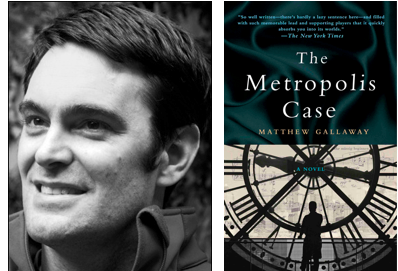
“So well written — there’s hardly a lazy sentence here — and filled with such memorable lead and supporting players that it quickly absorbs you into its worlds.” -The New York Times on The Metropolis Case
and
Book club members Michelle Lipinski, Grace Labatt, Michelle Rafferty and Justyna Zajac.
To accompany this podcast, we also present the following excerpt from the The Metropolis Case:
Through Its Street Names, the City Is a Mystic Cosmos
NEW YORK CITY, 1960. Anna Prus stepped out of her apartment building onto Seventy-fourth Street, where she paused to glance back at Central Park, which looked opaque and grainy like an old newsreel. It had been snowing for days, but a sallow, expectant glow emanating from the crenellated perimeter of the park told her the storm was nearing an end. While she did not relish the idea of negotiating a trip downtown, the transformation of the city into a tundra, with squalls of powder and amorphous mounds where there had once been cars, mailboxes, and shrubs, struck her as the perfect accompaniment to the magic, improbable turn the day had taken, now that she was about to make her Isolde debut at the Metropolitan Opera.
Though Anna was not an unknown, she had to this point in her career been relegated to smaller houses and (except for some minor roles) hired by the Met as an alternate to the type of leading soprano she had always wanted to be. But as sometimes happened with singers her age—Anna was forty—her voice, after six years at the conservatory and over fifteen more of training, auditioning, and performing, had at last blossomed, giving her reason to believe that she had found her calling in the Wagnerian repertory. Which is not to say her future had been unfurled like a red carpet; if anything, her reputation as a dependable but hardly breathtaking talent still preceded her, and for this current production, she had been brought in only to “cover” the Isolde and so had expected—as she had always done in the past—to spend her nights in the wings, anxiously hoping and not hoping (because she was not one to wish ill health or

By: Michelle,
on 4/4/2011
Blog:
OUPblog
(
Login to Add to MyJacketFlap)
JacketFlap tags:
Music,
History,
US,
UK,
Media,
smoking,
thompson,
1960s,
Leisure,
typewriters,
alternative,
gordon,
gordon thompson,
please please me,
counterculture,
sixties,
Strand book store,
Bieber,
The Oxford Comment,
oxford comment,
*Featured,
john mcmillian,
smoking typewriters,
underground press,
Audio & Podcasts,
Jesse Kornbluth,
headbutler,
kornbluth,
mcmillian,
Add a tag
Are we living in the “anti-60s”? The Oxford Comment compares the counterculture movement to the blogosphere and pop music today….Bieber vs. Beatles! Hipsters vs. Hippies! Let the showdown begin…
Want more of The Oxford Comment? Subscribe and review this podcast on iTunes!
You can also look back at past episodes on the archive page.
Featured in this Episode:
Lauren Skypes with Gordon Thompson, Professor of Music at Skidmore College and author of Please Please Me: Sixties British Pop, Inside Out. You can read Thompson’s OUPblog column here.

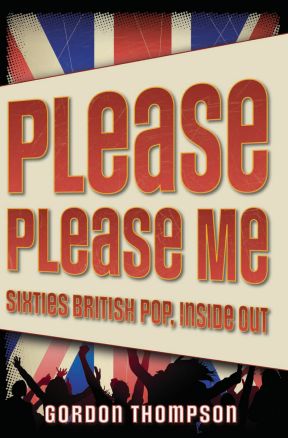
* * * * *
Michelle visits the Strand Book Store in New York City and speaks with John McMillian*, author of Smoking Typewriters: The Sixties Underground Press and the Rise of Alternative Media in America,

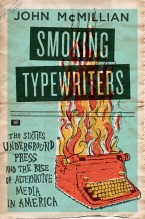
and Jesse Kornbluth, founder of HeadButler.com.
* * * * *
The Ben Daniels Band


By: Michelle,
on 3/9/2011
Blog:
OUPblog
(
Login to Add to MyJacketFlap)
JacketFlap tags:
Politics,
Current Events,
Middle East,
Afghanistan,
9/11,
terrorism,
colbert,
archive,
CIA,
colbert report,
osama bin laden,
The Oxford Comment,
oxford comment,
ben daniels band,
*Featured,
michael scheuer,
scheuer,
osama,
laden,
counterterrorism,
cia’s,
podcast,
Biography,
Add a tag
What does Osama bin Laden really want from us? Listen to this podcast and find out.
Want more of The Oxford Comment? Subscribe and review this podcast on iTunes!
You can also look back at past episodes on the archive page.
Featured in this Episode:
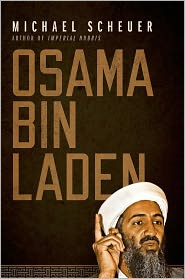 Michael Scheuer was the chief of the CIA’s bin Laden unit from 1996 to 1999 and remained a counterterrorism analyst until 2004. He is the author of many books, including the bestselling Imperial Hubris: Why the West is Losing the War on Terrorism (recommended by bin Laden himself). His latest book is the biography Osama bin Laden which he recently discussed on The Colbert Report (and this podcast!).
Michael Scheuer was the chief of the CIA’s bin Laden unit from 1996 to 1999 and remained a counterterrorism analyst until 2004. He is the author of many books, including the bestselling Imperial Hubris: Why the West is Losing the War on Terrorism (recommended by bin Laden himself). His latest book is the biography Osama bin Laden which he recently discussed on The Colbert Report (and this podcast!).
* * * * *
The Ben Daniels Band



By: Lauren,
on 2/23/2011
Blog:
OUPblog
(
Login to Add to MyJacketFlap)
JacketFlap tags:
movies,
film,
oscars,
words,
Dictionaries,
Online Resources,
oed,
oxford english dictionary,
usages,
bada,
academy awards,
bing,
The Oxford Comment,
oxford comment,
*Featured,
Lexicography & Language,
Katherine Connor Martin,
Matt Kohl,
TV & Film,
i want a hippopotamus for christmas,
Add a tag
With the Academy Awards right around the corner, we thought it might be fun to look at the lexical impact of films and some words that were actually coined by movies. Joining us for this Quickcast are two “excellent” members of the esteemed Oxford English Dictionary team.
Want more of The Oxford Comment? Subscribe and review this podcast on iTunes!
You can also look back at past episodes on the archive page.
Featured in this Episode:
Katherine Connor Martin, Senior Editor – OED
Matt Kohl, Senior Editorial Researcher – OED

And should you be interested in getting a hippopotamus for Christmas…
* * *
Lights, camera, lexicon: the language of films in the OED
By Katherine Connor Martin
Film, that great popular art form of the twentieth century, is a valuable window on the evolving English language, as well as a catalyst of its evolution. Film scripts form an important element of the OED’s reading programme, and the number of citations from films in the revised OED multiplies with each quarterly update. The earliest film cited in the revised OED, The Headless Horseman (1922), actually dates from the silent era (the quotation is taken from the text of the titles which explain the on-screen action), but most quotations from film scripts represent spoken English, and as such provide crucial evidence for colloquial and slang usages which are under-represented in print.
Scripts as sources
It is therefore no surprise that, although the films cited in OED represent a wide range of genres and topics, movies about teenagers are especially prominent. The film most frequently cited thus far in the OED revision, with 11 quotations, is American Graffiti, George Lucas’s 1972 reminiscence of coming of age in the early 1960s; second place is a tie between Heathers (1988), the classic black comedy of American high school, and Purely Belter (2000), a British film about teenagers trying to scrape together the money to buy season tickets for Newcastle United FC. But the impact of cinema on English is not limited simply to providing lexicographical evidence for established usages. From the mid-twentieth century, the movies as mass culture have actually shaped our language, adding new words to the lexicon and propelling subcultural usages into the mainstream.
The use of a word in a single film script can be enough to spark an addition to the lexicon. Take for instance shagadelic, adj., the absurd expression of approval used by Mike Myers in Austin Powers (1997), which has gained a currency independent of that film se

By: Michelle,
on 2/14/2011
Blog:
OUPblog
(
Login to Add to MyJacketFlap)
JacketFlap tags:
Music,
npr,
Valentine's Day,
Jazz,
Leisure,
concise,
archive,
count basie,
duke ellington,
kevin,
Fresh Air,
woogie,
Thelonious Monk,
The Oxford Comment,
*Featured,
Kevin Whitehead,
Why Jazz?,
whitehead,
psssst,
singledom,
Add a tag
Romance your date with a Monk-inspired duet, or have a private boogie-woogie party in honor of your singledom. This Valentine’s Day The Oxford Comment presents a crash course on the music that speaks all kinds of love, from one of the men that knows it best.
Want more of The Oxford Comment? Subscribe and review this podcast on iTunes!
You can also look back at past episodes on the archive page.
Featured in this episode:
Kevin Whitehead is long-time jazz critic for National Public Radio’s Fresh Air and has written about jazz for many publications, including the Chicago Sun-Times, Down Beat, and the Village Voice. His latest book is Why Jazz?: A Concise Guide.

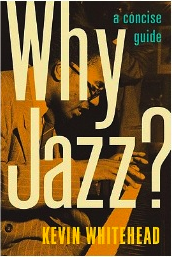
(Psssst! Wanna hear more blues? Then check out The Ben Daniels Band.)


By: Lauren,
on 2/3/2011
Blog:
OUPblog
(
Login to Add to MyJacketFlap)
JacketFlap tags:
Law,
tumblr,
roller,
Africa,
*Featured,
Sociology,
fashion,
feminism,
obesity,
beauty,
body image,
Online Resources,
fat,
Cleopatra,
Duane Roller,
The Oxford Comment,
oxford comment,
ben daniels band,
fat acceptance,
beauty bias,
berg fashion library,
body politics,
deborah rhode,
fashion institute of technology,
jessica jarchow,
margitte kristjansson,
tangledupinlace,
deborah,
rhode,
riotsnotdiets,
jarchow,
margitteleah,
Add a tag
In this, the 10th Oxford Comment, Lauren and Michelle investigate what makes a classic beauty icon, learn about appearance-based discrimination, talk body politics, and discover the threads that tie fashion to beauty.
Want more of The Oxford Comment? Subscribe and review this podcast on iTunes!
You can also look back at past episodes on the archive page.
Featured in this episode:
Historian, archaeologist, and classical scholar, Duane W. Roller is emeritus professor at Ohio State University and the author of eight books, the most recent of which is Cleopatra: A Biography. Read his OUPblog posts here.
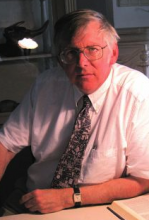
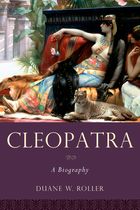
* * * * *
Deborah L. Rhode is the Ernest W. McFarland Professor of Law and Director of the Center on the Legal Profession at Stanford University. She is the author or editor of over twenty books, including The Beauty Bias: The Injustice of Appearance in Life and Law.
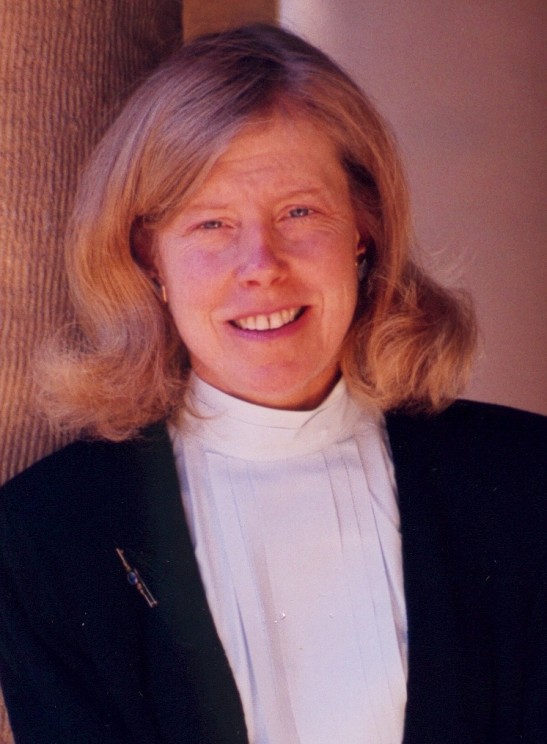

* * * * *
Margitte Leah Kristjansson is a PhD student in communication at UCSD whose work is situated within the emerging field of fat studies. She is interested in all things fat, and blogs about her interests at margitteleah.com and riotsnotdiets.tumblr.com. Margitte recently completed a documentary on fat female bodies and visibility available for viewing here.
Jessica Jarchow is a body acceptance activist in San Diego, CA. When she’s not blogging at
0 Comments on The Oxford Comment: Episode 6 – BEAUTY! as of 1/1/1900
What’s The Oxford Comment?
In Spring 2010, Michelle Rafferty and Lauren Appelwick (you can read their bios here) decided it was time Oxford University Press got a podcast, and by September, The Oxford Comment was born. Reporting at special events, live on the street, and from the “studio,” each episode features commentary from Oxford authors and friends of the Press.
How can I hear more of that super groovy background music?
Most of the music you hear is by The Ben Daniels Band. You can check them out here.
How can I get ya’ll on my iPod, or Zune, or whatever?
Pretty easy, just subscribe on iTunes.
The Oxford Comment podcastography
February 3, 2010
What IS beauty anyway?
- “The Icon” – Duane Roller discusses the ongoing influence of Cleopatra’s beauty (although we don’t really know what she looked like!)
- “The Beauty Bias” – Deborah Rhode discusses the pervasiveness of appearance discrimination.
- “The Fat-o-sphere” – Margitte Kristjansson and Jessica Jarchow talk body politics, “headless fatties,” s-heroes, and Glee!
- “The Safety Pin” – Fashionistas at FIT discuss whether or not clothing makes you beautiful.
January 13, 2011
Part 2 of this series looks at the ongoing debate between science and religion.
- “Why are Unicorns Hollow?” – Steve Paulson, Executive Producer of NPR’s To the Best of Our Knowledge, shares clips of interviews with famed atheist Richard Dawkins and chimpanzee advocate Jane Goodall.
December 21, 2010
Happy Birthday to the jazz legend who would be turning 103 this December 25th.
- “Hi-De-Ho” – BBC Producer Alyn Shipton on the pioneering ways of Cab Calloway.
- “Trickeration” – Vince Giordano plays the bandleader at Babette’s nightclub on HBO’s Boardwalk Empire. Michelle pays a visit to the real nightclub where Giordano keeps the music of the Jazz Age alive.
View Next 6 Posts















